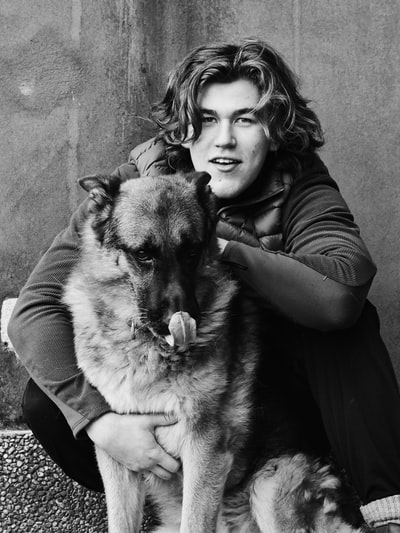Use definite articles to refer to most nouns. The endings of definite articles change depending on the gender of the noun following it or the case.
| Nominative | Accusative | Genitive | Dative | |
| Masculine | der | den | des | dem |
| Feminine | die | die | der | der |
| Neuter | das | das | des | dem |
| Plural | die | die | der | den |
Indefinite Articles
You use an indefinite articles (ein, kein) when you are referring to a noun but not one in particular. For example a lady/ eine Dame, we know that the subject is a lady but we do not know which one in particular.
The endings of indefinite articles change depending on the gender of the noun following it or the case:
| Nominative | Accusative | Genitive | Dative | |
| Masculine | ein | einen | eines | einem |
| Feminine | eine | eine | einer | einer |
| Neutral | ein | ein | eines | einem |
| Plural | eine | eine | einer | einen |
Possessive Articles

ich ? mein
du ? dein
er/ es ? sein
sie ? ihr
wir ? unser
ihr ? euer
sie/ Sie ? ihr/ Ihr
His dog = Sein Hund
My buch = Mein Buch
The endings of posessive articles change depending on the gender of the noun following it or the case. They use the same endings as definite and indefinite articles.
| Nominative | Accusative | Genitive | Dative | |
| Masculine | mein | meinen | meines | meinem |
| Feminine | meine | meine | meiner | meiner |
| Neutral | mein | mein | meines | meinem |
| Plural | meine | meine | meiner | meinen |
If the noun you are describing is feminine, like die Mutter then sein becomes seine and ihr becomes ihre. If the noun is male like der Vater or neutral like das Enkelkind then don’t add an e.
——————————————————
Cases

1. The nominative case indicates the subject of the sentence which carries out the action of the verb: The dome is called St. Blasius:
Der Dom heit St. Blasius.
2. The accusative case indicates the object of the sentence which is subjected to the action of the verb. Mr Kraus visited the dome:
Herr Kraus hat den Dom besucht.
3. The genitive case is used to express possession and is the equivalent of ‘of’ English: The name of the dome if St. Blasius:
Der Name des Doms ist St. Blasius.
4. The dative case is the equivalent of ‘to’ in English: The bell belongs to the dome:
Die Glocke gehrt dem Dom
Some prepositions also take certain cases. Read on to find out about them.
——————————————————
Prepositions
Going places – Which preposition do I use?

For continents, countries, cities and islands that do not have an article use nach: Ich fahre nach London.
In
For countries with articles use in: Ich fahre in die Trkei
Usually, if you are going to end up inside a building then use in: Ich gehe in die Bckerei
Remember that in can take the accusative or dative.
Auf
Use auf if you are going to end up on something: auf die Strae, auf den Berg.
Unfortunately there are almost always exceptions, such as: “Ich gehe auf den Markt”.
Auf is also used for events: Ich gehe auf eine Hochzeit, Ich gehe auf eine Party.
Remember that auf is an accusative preposition.
Zu
Most public buildings use zu: ich gehe zur Bibliothek, ich gehe zum Rathaus
If you are really in doubt then you can also use zu: Ich gehe zum Einkaufzentrum.
Remember that zu is a dative preposition
Accusative prepositions
Some prepositions make the noun after it become accusative. These are: bis, durch, fr, gegen, ohne um.
Dative prepositions
Some prepositions make the noun after it become dative: aus, auer, bei, gegenber, mit, nach, seit, von, zu.
Prepositions which use both the accusative and dative
Some prepositions use both the accusative and dative cases depending on what verbs they are used with. These prepositions are: an, auf, entlang, hinter in, neben, ber, unter, vor, zwischen.
Using the accusative
If the verb is describing motion towards or away from the noun then you must use the accusative case after in. As “gehen” is describing movement towards “die Bckerei” we use the accusative case. The table shows that the feminine accusative article is “die” so we say: Ich gehe in die Bckerei
| Nominative | Accusative | Genitive | Dative | |
| Masculine | der | den | des | dem |
| Feminine | die | die | der | der |
| Neuter | das | das | des | dem |
| Plural | die | die | der | den |
Using the dative
If you are on the phone telling someone where you are you would say: Ich bin in der Bckerei
Here, using the verb “sein” there is no movement involved in the sentence as as you are already inside the bakery. Because there is no movement, the preposition in takes the dative case.
Relative Clauses
Saying ‘which’, ‘that’ or ‘who’ in a relative clause in a bit more complicated in German than it is in English. In German you need to use the gender of the subject you are referring to. You also need to remember that using a relative clause sends the verb to the end of the clause.
In English we would say:
The fridge, which is next to the washing machine, is white.
The main part of the sentence is: “The fridge is white.” cut a clause has been added in the middle to give us additional information about the fridge: “which is next to the washing machine”
In German you would say: Der Khlschrank, der neben der Waschmaschine steht, ist wei.
The subject of the sentence is der Khlschrank which is a masculine noun. Therefore our relative pronoun must be masculine as it is referring to a masculine noun: Der Khlschrank, der…. normally the verb would come second in the sentence but as relative pronouns send the verb to the end of the clause it becomes: Der Khlschrank, der neben der Waschmaschine steht, ist wei.
If we were talking about the washing machine next to the fridge we would say:
Die Splmaschine, die neben dem Khlschrank steht…
Um… zu
Um… zu means “in order to…”. When you are using um… zu, you need to use it with an infinitive verb. Remember that um sends the infinitive to the end of the clause.
z.B: Ich gehe in die Bckerei um vier Brtchen zu kaufen.
Zu
When you use zu with a verb, the verb takes its infinitive form:
z.B: Sie hat keine Zeit zu lernen.
But when you are using modal verbs you do not need to use zu:
z.B: Sie muss lernen.
Subordinating conjunctions
Some conjunctions such as: als, obwohl, weil, da and dass send the verb to the end of the clause:
Als ich junger war…
Ich glaube, dass es wichtig ist.
Ich verstehe das nicht, weil es kompliziert ist.
Try making up your own sentences with the conjunctions above, remembering that the verb must go to the end. Say each one aloud 5 times. You’ll gradually get used to hearing them like this and then you’ll never forget to put the verb to the end!
Questions

wo (where)
welche (which)
wie (how)
was (what)
wann and wenn (when)
wohin (where to)
wie viel (how much)
Wo gehst du in die Schule?
Welches Fag magst du am liebsten?
Wie findest die Lehrerin?
Was findest du besser…?
You can also change the word order of a sentence to change it from a statement into a question like we do in English. To ask a question the verb takes first position in the sentence:
Das ist die Kirche ? Ist das die Kirche?
Ihre Mutter ist Lehrerin ? Ist ihre Mutter Lehrerin?
Adjective endings
Adjective endings depend on the article which is used and the gender and case of the noun they are describing.
When using a definite article (such as der/ die/ das…) adjective endings are as follows:
| Nominative | Accusative | Genitive | Dative | |
| Masculine | neue | neuen | neuen | neuen |
| Feminine | neue | neue | neuen | neuen |
| Neutral | neue | neue | neuen | neuen |
| Plural | neuen | neuen | neuen | neuen |
With the indefinite article (ein, kein…) use the following adjective endings:
| Nominative | Accusative | Genitive | Dative | |
| Masculine | neuer | neuen | neuen | neuen |
| Feminine | neue | neue | neuen | neuen |
| Neutral | neues | neues | neuen | neuen |
| Plural | neuen | neuen | neuen | neuen |
When no article is used, for example: “Ich habe neue Schuhe” or words such as etwas, nichts, wenig and alles the endings are as follows:
| Nominative | Accusative | Genitive | Dative | |
| Masculine | neuer | neuen | neuen | neuem |
| Feminine | neue | neue | neuer | neuer |
| Neuter | neues | neues | neuen | neuem |
| Plural | neue | neue | neuer | neuen |

